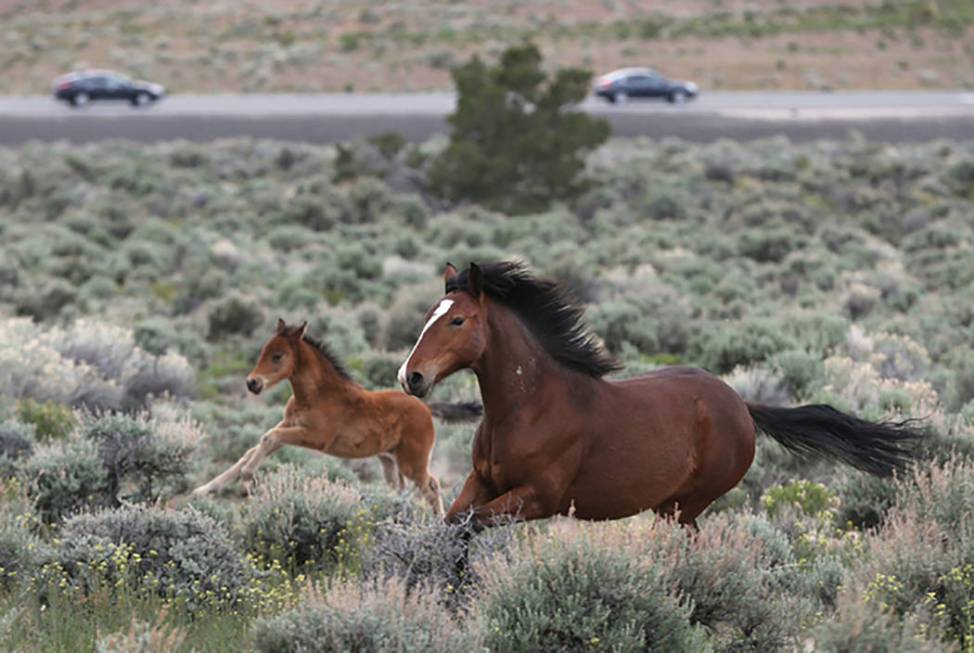COMMENTARY: Plan puts wild horses at risk of slaughter

Last week, several members of Congress expressed their strong objections to the U.S. Forest Service’s plan to sell federally protected wild horses without restrictions on slaughter.
The horses at risk are from the Devil’s Garden Plateau Wild Horse Territory, located in northern California. Such territories are public lands that have been designated under the law to protect wild horses and allow them to live in their natural habitats.
The Forest Service rounded up 932 Devil’s Garden horses last fall, claiming there are too many horses in the 300,000-acre territory. Seemingly endless roundups and removals are regrettably par for the course in terms of how the federal government manages wild horses. But the Forest Service’s announcement that it would remove restrictions on slaughter in order to expedite the sale of these animals was unprecedented.
Wild horses are protected under the landmark Wild and Free-Roaming Horses and Burros Act of 1971. The statute mandates that the Forest Service and the Bureau of Land Management protect these “living symbols” of our nation’s heritage from harassment or death. Today, the Forest Service manages approximately 8,000 horses and burros across much of the western United States, from Montana to New Mexico.
The Forest Service has historically abided by the prohibitions that Congress passes each year through the appropriations process that bar the BLM from selling or transferring wild horses in any way that results in their destruction for commercial purposes.
These safeguards are included year after year because — even in a charged and polarized political climate — most lawmakers agree that our country’s mustangs shouldn’t end up on somebody’s dinner plate abroad.
Horse slaughter remains wildly unpopular in America — national polls show that 80 percent of Americans oppose it. This should come as no surprise, given the history of horses helping to build this country, their status as companion, performance and working animals and the total lack of a domestic market for their meat. Still, tens of thousands of horses are transported to slaughterhouses in Canada and Mexico each year. “Kill-buyers,” individuals who profit from selling horses into slaughter, typically buy horses to fulfill contracts with slaughterhouses abroad.
In 2015, the Department of the Interior’s office of inspector general released an investigation showing that the BLM had inadvertently sold a staggering 1,800 wild horses to a single notorious kill-buyer due to lax oversight. The agency had egg on its face and the public, as well as members of Congress, were rightly outraged. Of course, what the Forest Service is proposing to do would funnel horses directly into the slaughter pipeline by creating a clear incentive for kill-buyers to obtain animals (and unlike the BLM, the Forest Service could not possibly maintain that it had no knowledge of what was happening right under its proverbial nose).
Lawsuits are currently playing out in the courts that could determine the fate of the Devil’s Garden horses and affect how the Forest Service proceeds. At issue, in part, is whether the agency would violate existing California law banning the sale and transfer of horses for human consumption. Indeed, the California attorney general also wrote to the USDA, emphasizing that “these proposed unconditional sales raise substantial concerns under California state law.”
Even if the situation in California is ostensibly resolved once the legal dust settles, the agency may still be free to attempt sales without slaughter restrictions in other states. That’s why it’s imperative that Congress acts to protect wild horses under the Forest Service’s purview. Lawmakers are currently drafting appropriations bills for fiscal 2020 that present an ideal opportunity to close the perceived loophole that the agency seems bent on exploiting. Congress should ensure that the protections afforded to BLM-managed herds extend to the Forest Service herds as well.
Without such explicit direction, the agency could continue to go rogue and skirt provisions concerning the humane and appropriate management of federally protected wild horses. Condemning our wild horses to die in foreign-owned-and-operated slaughterhouses is no way to “manage” herds.
Joanna Grossman is the equine program manager for the Washington, D.C.-based Animal Welfare Institute.